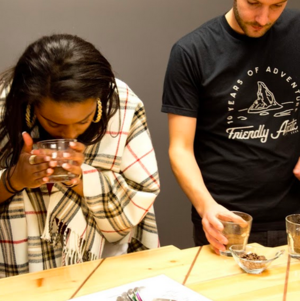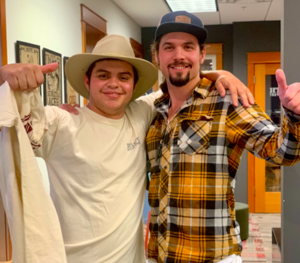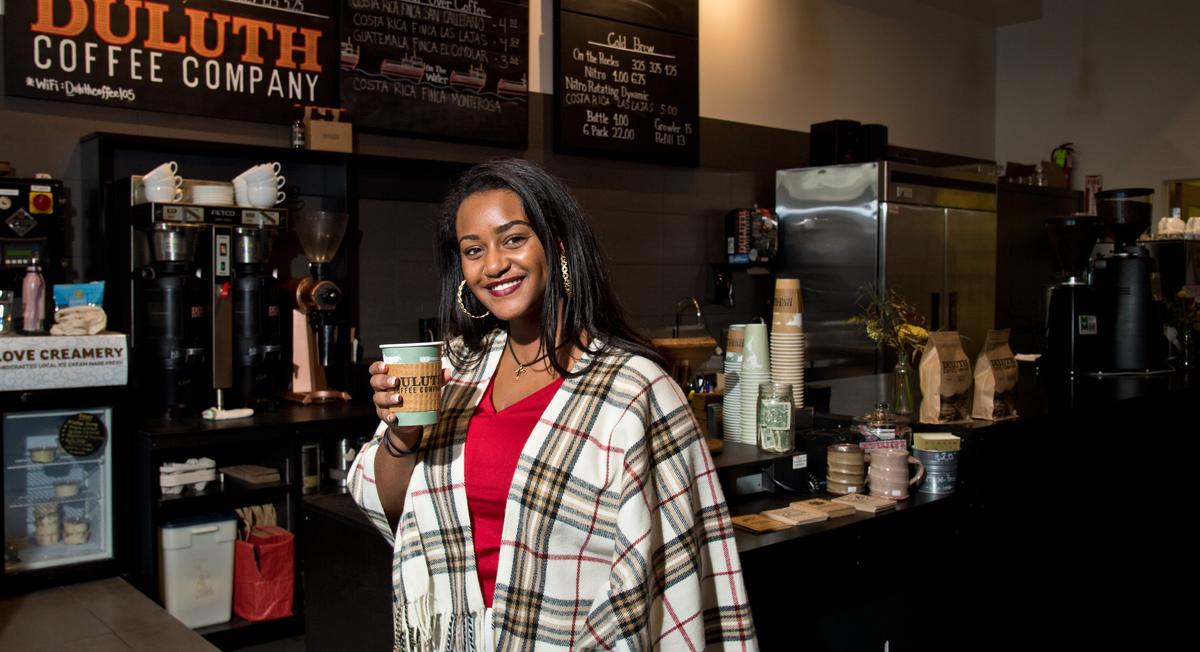Persabelle Debela, an international student from Ethiopia, is pursuing an accelerated Masters in Business Administration and exploring the world of coffee on the way.

Persabelle uses a "cupping" method to test different coffee varieties.
Since graduating with a bachelors degree in entrepreneurship from the Labovitz School of Business and Economics in Spring 2018, she's been hard at work in the 12-month MBA program. She's deep into a major project about compensation for farmers and the coffee export business.
Persabelle has found allies in two companies, the Duluth Coffee Company, a coffee roasting company and coffee house in Duluth, and Cafe Imports, an independent, from the source, importer of green coffee beans, in Minneapolis.
The staff of these two Minnesota companies showed her the problems in the system. “The fair trade system isn’t always fair,” she says. Fair trade products are made according to a set of strict standards that encourage environmental sustainability. Yet, some areas are overlooked. “Coffee has natural toxins and when the green beans are washed on site, the water becomes toxic, even the water people use for living,” Persabelle says.

Diego Abarca, a coffee farmer from Costa Rica and Eric Faust, owner of Duluth Coffee Company
The fair trade guidelines try to ensure that the people involved in production are treated and compensated fairly. “But, farmers get paid based on the commodity market, where the price is set by the stock market,” Persabelle says. “The income farmers receive doesn’t compensate them for the work. It’s often too low to support a family.”
She is working with Duluth Coffee Company founder and owner Eric Faust, who has built relationships with farmers in Colombia, Costa Rica, Guatemala and Mexico. Persabelle says Eric and his staff are “constantly supportive, providing networking and telling their own stories and how they import their coffee."
In fall 2018, Cafe Imports and the Duluth Coffee Company brought Diego Abarca, a Costa Rican coffee farmer, to visit Duluth. He shared his experience with coffee farming and participated in “cupping,” a system used to analyze quality.
Persabelle joined the tasting session. “We looked at all the steps, and then the color, the smell, and the way the liquid tasted,” she says. “How much acidity did each cup have? Was there a burnt taste? As we tried each cup, we gave our overall impressions."
By diving into all the aspects of the international coffee business from growing, importing, roasting, and sales, Persabelle is narrowing down her MBA project.
Persabelle is also interested in how the sale of coffee impacts her own country. There is an Ethiopian Commodity Exchange policy that prohibits selling the best grades of coffee to the citizens of Ethiopia. The highest quality coffee can't be sold in the country. "Ethiopian coffee is some of the best coffee in the world,” she says. Some day, she would like to see people from Ethiopia have access to that coffee without restrictions.
“I want to take what I learn and make changes to help farmers,” she says. "In the long run, I want to make a difference."
